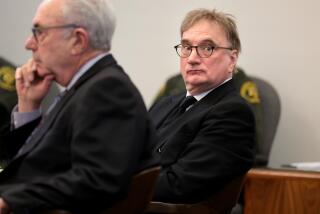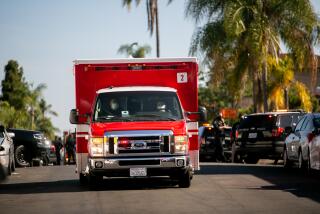Dr. Gail V. Anderson dies at 88; pioneer in emergency medicine field
Emergency rooms weren’t always staffed by specialists — doctors well-versed in making life-or-death decisions when a patient arrives at the hospital in cardiac arrest, bleeding from a gunshot wound, or suffering from a drug overdose.
That all started to change in the late 1960s and early 1970s when small groups of physicians across the U.S. began pushing to professionalize the field of emergency medicine, creating a specialty that is now an essential component of the American healthcare safety net.
One of those pioneers was former Los Angeles County-USC Medical Center physician Dr. Gail V. Anderson, the first chairman of an academic department of emergency medicine in the U.S.
Anderson, 88, died of complications from pneumonia on Sept. 6 in Pasadena. His death was announced by USC.
Gail Victor Anderson was born on Oct. 3, 1925, in Pensacola, Fla., the second of the three children of Parke Pleasant and Sarada Thompson Anderson, a carpenter and a homemaker both originally from Oklahoma.
His mother died when he was 12, leaving him with a lot of responsibility in the family, said his son, Gail V. Anderson Jr.
Immediately after high school, he joined the U.S. Navy and served as a medical corpsman in Trinidad during World War II, treating sailors wounded in battle. He later majored in biology at Columbia Union College in Washington, D.C., attended medical school at Loma Linda University, and completed his residency in obstetrics and gynecology in Washington, D.C.
Anderson returned to Southern California in 1958 to serve as director of the OB-GYN department at what was then Los Angeles County General Hospital, eventually becoming acting chairman of the obstetrics and gynecology department at USC, where he trained physicians in advanced surgical techniques such as vaginal hysterectomies, his son said.
When the university appointed a permanent chair of the obstetrics and gynecology department in 1971, then-County-USC medical director Dr. Robert Tranquada, who was concerned about persistent problems with emergency care at the facility, asked Anderson to create a new emergency medicine department.
“I knew how dedicated he was to doing the right things at County-USC,” Tranquada, now an emeritus professor of medicine and health policy at USC, said Monday. “He was the logical person.”
Anderson almost immediately leaped into the work of solidifying emergency medicine as its own specialty, Tranquada said, launching the first continually running residency program at USC, working in concert with a small group of innovators across the nation who defined the skills that would be required of emergency physicians, and delineating what training emergency doctors would receive.
At the time, said Edward Newton, interim chairman of the department of emergency medicine at USC, emergency medicine was a disorganized field, with most emergency rooms staffed by people “moonlighting” from a variety of specialties.
“You might have a dermatologist take care of your appendix,” said Newton, who trained under Anderson.
Anderson and his colleagues began to change that by defining the specific set of skills that emergency physicians needed to know, said Dr. Hans House, a professor of emergency medicine at the University of Iowa in Iowa City and a USC medical school graduate who knew Anderson during his student days.
In 1976, Anderson was one of the founders of the American Board of Emergency Medicine, the body that certifies emergency medicine physicians; in 1978, emergency medicine was officially recognized as a medical specialty. Anderson served as president of that organization from 1987 to 1988, said Gail Anderson Jr., also an emergency physician.
In all, Anderson headed USC’s emergency medicine department for 31 years, helping to transform the training program into one of the largest in the country. Colleagues described him as a stoic and amiable leader and an imposing presence in hospital corridors.
Anderson lived in South Pasadena, where he served as president of the school board and team doctor for high school athletic teams. He was an avid tennis player and loved sailing his Sunfish boat in the marina, his son said.
In addition to Gail Jr., Anderson is survived by his wife Alice, a nurse, four other sons — David, Jerrold, Walter, and Mark — and five grandchildren.
A memorial service will take place at 11 a.m. Friday at USC’s Aresty Auditorium.
More to Read
Start your day right
Sign up for Essential California for the L.A. Times biggest news, features and recommendations in your inbox six days a week.
You may occasionally receive promotional content from the Los Angeles Times.







